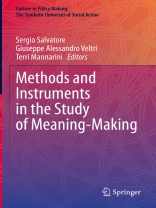This volume develops a theoretical framework for the modelling of meaning-making and cultural processes as crucial to the scientific study of contemporary complex societies. It focuses on the methodological and empirical aspects of the analysis of culture and its dynamics that could be applied to policymaking and to the understanding of social phenomena. It covers culture-based segmentation, ad hoc survey instruments like the VOC and PROSERV questionnaires, discourse flow analysis, the Homogenization of Classification Functions Measurement, and others. It also presents a detailed discussion of the methodology of cultural analysis in contexts of health and education. The volume showcases a top-down approach by including quantitative methods and/or automatized or semi-automatized procedures, and at the same time supports a hermeneutic, bottom-up, abductive approach, focused on the situated dynamics of meaning-making. It provides insights from cultural studies, socialstatistics, social policy, and research methodology in the social sciences. This is a useful resource for academics involved in studying cultural dynamics and for policy-oriented researchers and decision-makers who are interested in cultural dimensions of the design, implementation and reception of public policies.
Tabella dei contenuti
Part I: Theoretical Framework.- Chapter 1. The Meaning of Meaning (Sergio Salvatore ).- Chapter 2. Sensemaking Between Individuals and Society (Terri Mannarini).- Part II: The Content of Sensemaking.- Chapter 3. The Challenges of Cultural Segmentation: New Approaches from Social Data Science (Giuseppe Alessandro Veltri).- Chapter 4. The Map of Symbolic Universes and Lines of Semiotic Force: The View of Context (VOC) Questionnaire (Enrico Ciavolino).- Chapter 5. The Themes of Texts: The Automatic Co-Occurrence Analysis for Semantic Mapping (ACASM) (Alessandro Gennaro).- Part III. The Dynamics of Sensemaking.- Chapter 6. The Discourse Dynamics: The Discourse Flow Analysis (DFA) (Alessandro Gennaro).- Chapter 7. The Dimensionality of Sensemaking (Johann Kleinbub).- Part IV. Sensemaking and Affective Meaning.- Chapter 8. The Mediational Role of the Affective Meaning (Terri Mannarini).- Chapter 9. The Homogenizing Role of Affective Meaning: The Homogenization of Classification Functions Measurement (HOCFUN) (Mauro Cozzolino).- Part V. Sensemaking in Context.- Chapter 10. Cultural Values in Community Research (Terri Mannarini).- Chapter 11. The Perception of the Service: The PROSERV Questionnaire (Enrico Ciavolino).- Chapter 12. Logics of Value Constructions (Emanuela Ingusci).- Chapter 13. Meaning and Education (Anastassios Matsopoulos).- Chapter 14. Meaning and Policy (Carlotta Fioretti).- Chapter 16. Making Sense to the Clinical Relationship (Claudia Venuleo).- Part VI. Discussion.- Conclusion.
Circa l’autore
Sergio Salvatore is Professor of Dynamic Psychology at the Department of Human and Social Sciences, University of Salento (Italy)……. His scientific interests are in psychodynamic and semiotic theorization of psychological and social phenomena and the methodology of socio-cultural and mental processes as field dynamics. He also takes an interest in the theory and analysis of psychological intervention in socio-political, community, scholastic, organizational, and clinical fields. He has designed and managed various scientific projects on these issues and published about 250 works as books, chapters, and journal articles. He is co-editor of the Springer book series: Culture in Policy Making: The Symbolic Universes of Social Action, co-editor of the journal
Integrative Psychological and Behavioral Science (Springer), and Member of the Editorial/Advisor Board of several scientific journals. He worked as scientific Coordinator of the Re.Cri.Re Project (2015-2018), granted by the EU in the Horizon 2020 framework. He is Member of the Board on Educational Affairs of the European Federation of Psychologists’ Associations (2016-2019), President of the Board of the Professors and Researchers of Dynamic Psychology of the Italian University (2016-), and Vice President of the Associazione Italiana di Psicologia (AIP; Italian Association of Psychology; 2018-).
Giuseppe Alessandro Veltri has a BA in Psychology of Communication from the University of Siena, an MSc in Social Research Methods (Statistics) from the Methodology Institute of the London School of Economics (LSE), and a Ph D in Social Psychology from the LSE. He is Associate Professor of Research Methodology and Cognitive Sociology at the Department of Sociology and Social Research, University of Trento. He was Senior Lecturer at University of Leicester and has been a senior scientific fellow at the European Commission JRC Institute for Prospective Technological Studies (IPTS) in the unit of Social Innovation and ICT. Before joining the IPTS, he was a research associate at the Institut Jean Nicod (Ecole Normale Supérieure) in Paris. He has published in scientific journals such as Nature, PLOS One, Computers in Human Behavior, Public Understanding of Science, Big Data & Society and others. His latest book is
Digital Social Research (2019, Polity). He has carried out large European studies (H2020, EC framework contracts on behavioural research, etc.) using different methodologies such as surveys, population-based survey experiments online, lab experiments, focus groups, and more.
Terri Mannarini is Professor of Social Psychology at the University of Salento, Lecce, Italy, and editor-in-chief of the international journal
Community Psychology in Global Perspective. Her research interests cover political, social, and community psychology, and focus specifically on community participation and development processes, collective action, acculturation processes, and gender issues.












